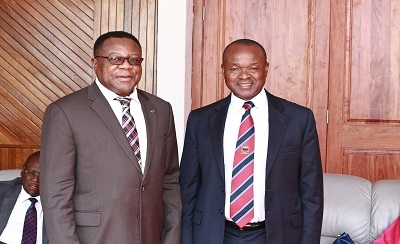
The implementation of Agenda 2063 will require an inclusiveness of all stakeholders as well as key leadership, institutional and organisation drivers at the continental, regional and national levels, private sector, civil society, academia, think Tanks, youth and women networks, faith based organizational amongst others, said African Capacity Building Foundations (ACBF) Executive Secretary, Prof. Emmanuel Nnadozie on Friday, 11 March 2016, at the African Union Commission (AUC) – The New Partnership for Africa's Development (NEPAD) – Africa Development Bank (AfDB) - United Nations Economic Commission of Africa (UNECA) – African Capacity Building Foundation (ACBF) – Regional Economic Communities (RECs) Coordination meeting is on course at the Mulungushi International Conference Centre (MICC) in Lusaka, Zambia.
Prof. Emmanuel Nnadozie said that in order to drive the implementation of Agenda 2063, there is need for all concerned institutions at the continental, regional and national levels to be allocated specific roles and responsibilities for the effective implementation of Agenda 2063.
He also proposed that the responsibility of the AUC should be, overall coordination and governance of the Agenda 2063; broad communication, awareness creation and sensitization of Agenda 2063 in collaboration with the RECs.
“The AUC should be in charge of policy making on resource mobilization and provide the leadership for global, continental and multilateral partnerships and negotiations,” said Prof. Nnadozie.
According to him, RECs are the building blocks of the AU and there should be a structural connection between the RECs and the AUC. He explained that RECS should become organic part of the AU, serving as Commissions of the AU at the regional level to ensure coherence in planning, decision making and implementation.
The presentation made by Prof. Nnadozie also focused on the complex and heavy institutional architecture at the regional and continental level including lack of clarity of mandates among AU organs as well as duplication of roles, functions and activities. He also proposed specific roles for NEPAD planning and Coordinating Agency, the African Peer Mechanism (APRM), and the Pan African Parliament (PAP).
At the end of his presentation, he recommended that the Constitutive Act should be reviewed and realigned to meet the needs of the continental agenda while mandates of institutions should be revisited in order to further clarify, harmonize and reduce duplication and ‘turf’ congestion.
Other recommendations made were on the modus operandi, work systems and functioning at the AU organs level as well as the governance and enforcement mechanism and decentralization of the AU to enable RECs to play more effective implementation roles with respect to member states.
The Coordination Meeting kicked off on 10th March with the Senior Experts meeting where key outcomes were agreed upon in preparation for the Chief Executive Meeting. The Senior Officials meeting had participants from AUC, ACBF, AfDB, EAC, ECCAS, CEN-SAD, COMESA, ECOWAS, IGAD, NEPAD NPCA, SADC, and UNECA.
The meeting outcomes focused on follow-up of the implementation of the previous recommendations of the last Coordination Meeting, Agenda 2063 and the first 10-year implementation plan and validation on the status of integration and AU Summit Closed Session on Integration.





